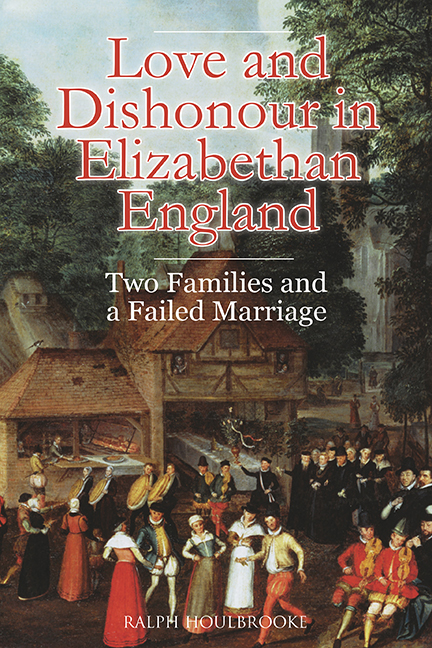Book contents
- Frontmatter
- Dedication
- Contents
- List of Illustrations
- Preface and Acknowledgements
- Notes on the Spelling of Names, Dates, and Currency
- List of Abbreviations
- map
- Miscellaneous Frontmatter
- Introduction
- Part I Two Families
- 1 The Jerninghams: Land, Court, and Catholicism
- 2 ‘A Very Lose Dealer’: The Downfall of John Jerningham of Somerleyton
- 3 The Forths: From Clothiers to Landed Gentry
- Part II An Unfortunate Marriage
- Part III Afterwards
- Bibliography
- Index
2 - ‘A Very Lose Dealer’: The Downfall of John Jerningham of Somerleyton
from Part I - Two Families
Published online by Cambridge University Press: 13 July 2019
- Frontmatter
- Dedication
- Contents
- List of Illustrations
- Preface and Acknowledgements
- Notes on the Spelling of Names, Dates, and Currency
- List of Abbreviations
- map
- Miscellaneous Frontmatter
- Introduction
- Part I Two Families
- 1 The Jerninghams: Land, Court, and Catholicism
- 2 ‘A Very Lose Dealer’: The Downfall of John Jerningham of Somerleyton
- 3 The Forths: From Clothiers to Landed Gentry
- Part II An Unfortunate Marriage
- Part III Afterwards
- Bibliography
- Index
Summary
John Jerningham was the eldest recorded son of George Jerningham and Ella or Eleanor Spelman, and was probably born not long after their marriage in 1534. The first known event in young John Jerningham's life, sometime between late 1554 and June 1558, was his admission to the ranks of the gentlemen pensioners. This body, founded in 1539 as Henry VIII's ‘elite bodyguard’, became ‘a courtly and military finishing school for the sons of nobility and gentry’. Jerningham's uncle John Sulyard, the standard bearer of the band, may have helped to secure his appointment to it. His great uncle Sir Henry Jerningham had however been the first of Jerningham's kins¬men to enter Mary's service, and his influence could have been even more important.
His marriage to Katherine Brooke, daughter of the Kentish peer George, ninth Baron Cobham, sometime after 7 October 1558 and by July 1560 at the latest, was a notable advancement for the son of a not particularly distinguished gentleman. Katherine had been born on 7 April 1544. There are some grounds for thinking that John Jerningham was not a natural choice as marriage partner for a member of the Brooke family. The ninth baron had been a member of Edward VI's Privy Council, and a trusted supporter of Jane Grey during her brief reign as uncrowned queen in 1553. In January 1554, after what was suspected to be a merely token resistance, he had surrendered his castle of Cooling in Kent to the rebel force led by his kinsman Thomas Wyatt against Queen Mary. He and three of his sons had then gone to Wyatt's camp. Despite his subsequent ‘escape’ from the camp, he had for a time been imprisoned in the Tower of London, and his three sons had been indicted for treason, though all had been pardoned. Cobham was also reported to be a ‘heretic’, i.e. a Protestant. His will, dated 13 January 1558, supports this suspicion. Prefaced with a straightforward expression of his trust in Christ's death, passion, and resurrection for the free remission and forgiveness of all his sins, it contains no distinc¬tive marks of Catholic piety, such as provision for intercessory masses.
- Type
- Chapter
- Information
- Love and Dishonour in Elizabethan EnglandTwo Families and a Failed Marriage, pp. 51 - 80Publisher: Boydell & BrewerPrint publication year: 2018



